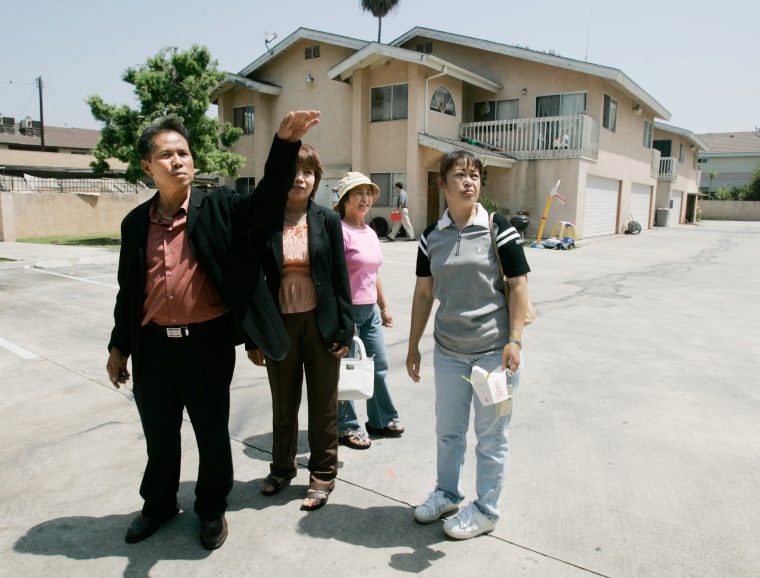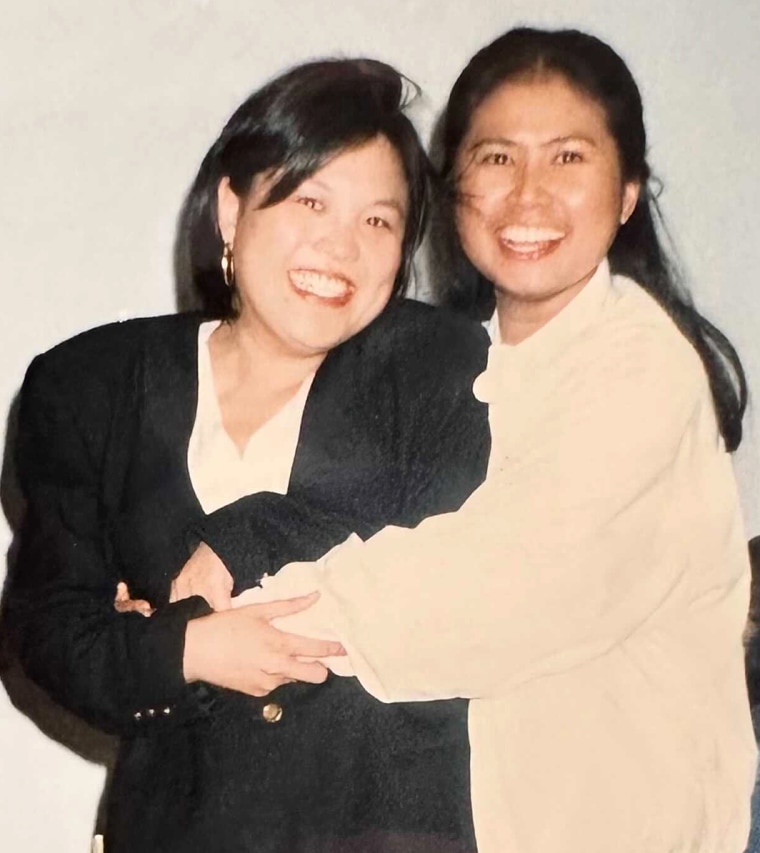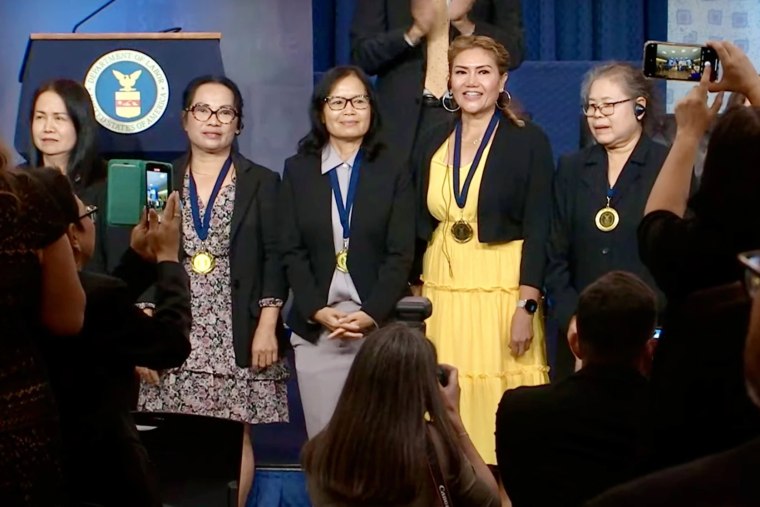Maliwan Radomphon Clinton, 54, says the image of the sweatshop compound where she was confined in El Monte, California, three decades ago is difficult to shake. She remembers the sewing machines she sat behind from dawn until after midnight, the sharp edges of the barbed wire encircling the premises and the armed guards who kept workers from escaping.
“We don’t know nothing about the outside,” she told NBC News.
Clinton is one of 81 Thai garment workers who were inducted into the Department of Labor’s Hall of Honor in Washington, D.C., this week for helping to expose their former employer’s abusive practices in 1995. The case, considered the first recognized case of modern-day slavery in the country since the constitutional abolishment of slavery, prompted landmark legal protections for low-income workers.
“I can’t even tell you how I feel,” Clinton said, laughing. ”I can’t believe I was over there in Washington, D.C., in history. … I’m so proud of ourselves and thank you to every single one of the people who helped us.”
Acting Labor Secretary Julie Su, who started her legal career nearly 30 years ago as the lead attorney for these garment workers, gave an emotional speech during the induction ceremony detailing her own connection to their story, as well as the workers’ greater significance to labor rights.

“Me and my friend, we thought we could come here and help our families. Our families were poor.”
Maliwan Radomphon clinton, on what drew her to an opportunity in the U.S.
“The most profound changes are personal. Like our honorees, standing up, building power, exercising their rights, and against all odds defying the message they have heard their entire lives: that they should just keep their heads down and know their place,” Su said during the ceremony on Monday.
Clinton and another former sweatshop employee, Nantha Jaknang, also spoke onstage about their experiences in the compound in the early ‘90s. And other Asian American political leaders, including Sen. Tammy Duckworth, D-Ill., additionally gave remarks.
Clinton told NBC News that the moment was unimaginable — a sharp contrast to the devastating situation she found herself in for two difficult years of her life. Clinton, who worked in the garment industry back in Thailand, explained that in her early 20s she was approached with an opportunity to work in the U.S., with all visa and travel expenses covered.
“Me and my friend, we thought we could come here and help our families. Our families were poor,” Clinton remembers. “And we were told that the contract only lasts for three years. We would probably have money left for our families, and that made us want to come.”

Upon arrival, however, it was almost immediately apparent that things were not as they were promised, Clinton said. The workers were bound to the seven-unit compound in El Monte, a city in L.A. County, where some were imprisoned for as long as seven years, she recounted. Grocery shopping, still paid for by the employees at a markup, was done by sweatshop operators so that the workers wouldn’t leave the premises, Clinton said. And while the seamstresses could take a single day off a month, they had to remain in the compound. Work days started around 6 a.m. and often ended past midnight, allowing for around four or five hours of rest, she said.
“We had nothing to lose ... We all stuck together and fought for our freedom. And yes, we did it.”
Maliwan Radomphon clinton, on fighting for freedom after the sweatshop was exposed
“I was depressed … I was already in there and there was nothing I could do,” Clinton said. “All we could do is suck it up, and when the time came, we would go home. That’s all me and my friend would talk about.”
Because the workers were unable to interact with the outside world, Clinton said, the sweatshop operators were able to easily exploit them. It was unclear whether they were being paid a comparable wage, for example, as there was no way to speak with those at other companies.
And since previous workers had attempted to hop the fence, refusing to withstand the abusive conditions, the sweatshop operators installed razor wire around the compound, Clinton said. A guard, usually armed with a machete, would prevent any possibility of escape. Violence was regularly threatened on the workers and their families, according to a Justice Department press release.
After receiving a tip from the boyfriend of an escaped worker, authorities raided the compound in August 1995, discovering the horrific conditions. The exposure of the sweatshop was initially a scary prospect, Clinton said. During their time at the sweatshop, the workers were frequently told that the police would punish them if they ever got out, she said, and so emotions stayed grim.
They were taken into custody for possible deportation, but the tides began to turn when organizations like the Thai Community Development Center came to advocate for them and Su offered to represent them, Clinton said. The workers ended up providing details, gathering old clothing and labels that they had made, to support the case. Some testified in court.
“We had nothing to lose,” Clinton said. “We all stuck together and fought for our freedom. And yes, we did it.”
“Look at us. We went from zero. We knew nothing. And look at us now. If we could do it, they can do it too.”
Maliwan Radomphon clinton, on the current labor strikes.
The workers sued the companies that contracted with the sweatshop, who agreed to pay more than $3.7 million to 150 El Monte workers. And while companies previously argued that subcontractors alone were liable for violations of workers’ rights, the efforts in the case led to the passage of California legislation that placed an onus on manufacturers and retailers for garment workers’ wages when contractors failed to properly compensate them.
The workers were also granted legal residency with the right to work in the country, with many eventually becoming citizens. Due in part to their story, Congress passed the Victims of Trafficking and Violence Protection Act, which created visas for victims of crimes, including human trafficking and forced labor, who assist law enforcement.
Ultimately, 10 Thai nationals were indicted for committing involuntary servitude and kidnapping, among several other charges.
Decades later, as a major labor reckoning sweeps the country with strikes across several industries from media and entertainment to auto, Clinton said she hopes others will derive inspiration from her story and continue fighting for their rights.
“Look at us. We went from zero. We knew nothing. And look at us now,” she said. “If we could do it, they can do it too.”
Since reclaiming their freedom, many of the workers have gone on to pursue their own endeavors, Clinton said. Some of her friends have opened businesses, others have launched restaurants or dabbled in real estate. Clinton currently works at Target, where she’s been for 20 years.
“To me, looking back when we were in the compound, it’s now totally different,” Clinton said. “Everybody’s doing so good. We have a good life.”
